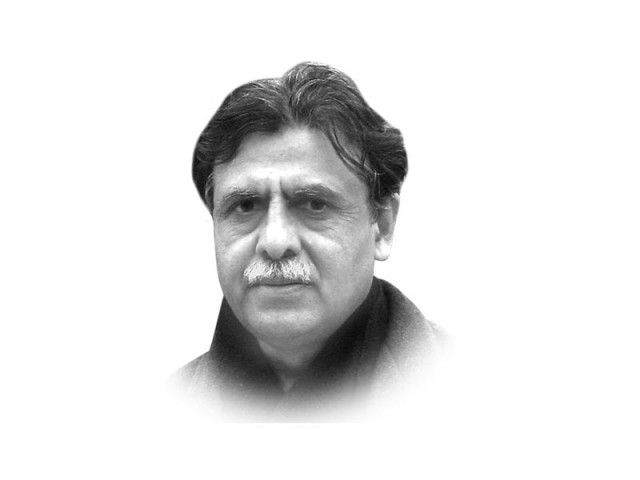Should the judiciary conduct the elections?
The conduct of elections, in essence, is by and large an administrative exercise

The writer is an author, a public policy analyst and a former interior secretary. He teaches at LUMS
Since 1985, we have had eight general elections in a row that were conducted by the subordinate judiciary with there also being full representation of former judges at the ECP simultaneously. Each election result was mired in virulent controversies and invited a lot of criticism against the ECP, as well as the officials entrusted with conducting elections. The aftermath of the 2013 elections saw the months-long dharna in Islamabad paralysing normal life and business of the state.
It is important to remember that in 2009, the newly promulgated judicial policy had drawn the lines on the role of the judiciary in the conduct of elections but on the insistence of Chief Election Commissioner Justice (retd) Fakhruddin G Ebrahim, a departure was made for the 2013 elections, which ended up sucking in the then chief justice into controversy as he had addressed the returning and assistant returning officers on different occasions. In view of the unrelenting criticism that followed in the wake of the election results and amid charges of rigging flying around, Justice Ebrahim resigned from his office.
The conduct of elections, in essence, is by and large an administrative exercise requiring requisite exposure, temperament and training. Returning officers do perform a quasi-judicial function as well when it comes to the scrutiny of nomination papers — a justiciable act that calls for the oversight of the ECP. The quasi-judicial function mainly revolves around the receipt and scrutiny of nomination papers, and declaring eligibility or otherwise of the prospective candidates. This exercise is conducted through due process in line with the provisions of the law and attendant rules.
But beyond the quasi-judicial element of the conduct of elections, this is a hands-on administrative exercise, which calls for an exceptional outreach. It’s a huge exercise in mobilising human and material resources, drawing on various agencies for a well clued-in polling staff that ensures fair and smooth conduct at the polls and the tabulating of election results. A former chief election commissioner of India with impeccable reputation, MS Gill, who was also an officer of the Indian Administrative Service, once declared the conduct of general elections a massive administrative exercise.
According to him, it required the same set of skills and mental frame that any administrative exercise would require. Gill has been credited with the introduction of electronic voting machines. This measure went a long way in addressing the problem of the abuse of votes. In India the marathon exercise of the general elections is spread over nearly two dozen states and is conducted in three long phases from Punjab in the northwest, to Tripura, Nagaland and Mizoram in the farther northeast.
In recent times, the Supreme Court of Pakistan has had to tread cautiously while taking up cases of public interest. The chief justice, while taking up such cases at the Karachi registry, has been at pains to explain as to why the court was constrained to interfere in executive work. With the induction of returning and assistant returning officers from the subordinate judiciary, any post-election controversy may well result in a repeat performance where the losing party and detractors throw the blame at the doorstep of the judiciary. Rigging, as we all know, has a grand design at the strategic level. All one requires is to recall the Asghar Khan case in which it emerged that an election cell was set up in the presidency right under the nose of President Ghulam Ishaq Khan. Dirty money was doled out to oil the election machine in order to ensure the IJI’s success.
Our recent past offers another glaring example of tampering with election results. The 2002 elections produced results that did not entirely favour Gen Musharraf despite his efforts of blocking the entry of the party heads of the PML-N and PPP. This led to the defection clause in the election rules to be waived to create a dissenting group within the PPP, which joined hands with the king’s party, enabling the required numbers to be managed to form the government.
Certain political quarters have already welcomed the move by the ECP to seek the appointment of judicial officers for conducting elections. At the same time, these quarters are critical of the bureaucracy as they feel it has been politicised and will fail to deliver free and fair elections if entrusted with the responsibility of conducting the polls. This statement does have a kernel of truth. A class of bureaucrats, over a period of time, has developed a close nexus and a functional relationship with the political incumbents. This is reinforced through perks, privileges and out-of-turn placements for certain bureaucrats over and above their peers. But such elements are identifiable and conspicuous by their visibility. It is not fair to cast aside an entire institution designed for a role akin to its charter. The general elections are a prospective exercise and do not warrant us to proceed on hypothetical assumptions.
Published in The Express Tribune, April 6th, 2018.
Like Opinion & Editorial on Facebook, follow @ETOpEd on Twitter to receive all updates on all our daily pieces.














COMMENTS
Comments are moderated and generally will be posted if they are on-topic and not abusive.
For more information, please see our Comments FAQ